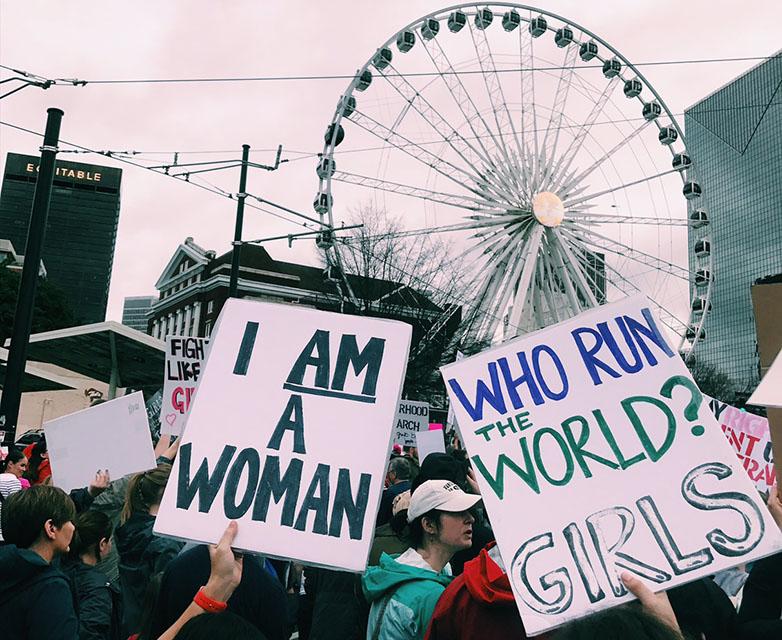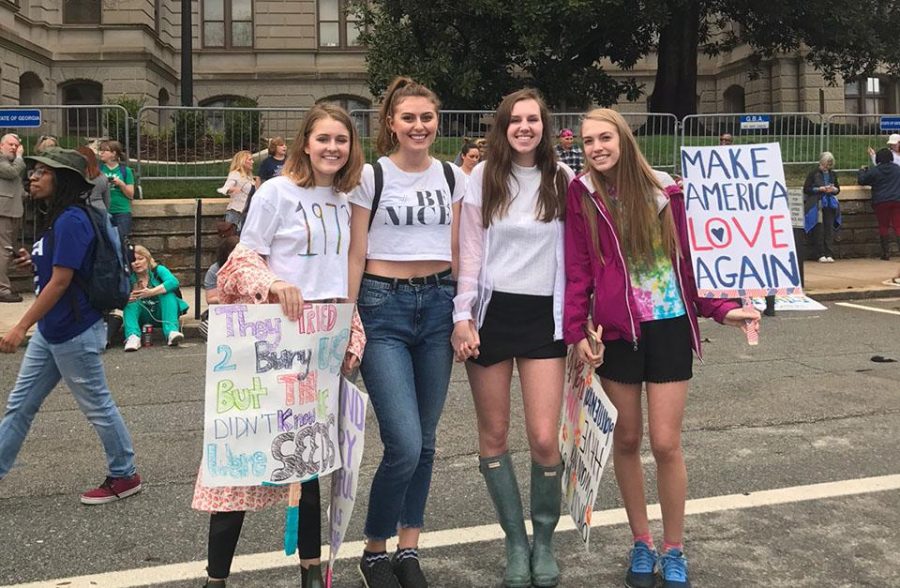Bears Take Part in Women’s March Atlanta
February 14, 2017
A sea of signs takes over downtown Atlanta, flooding the landscape with messages such as “A woman’s place is in the resistance” and “Who run the world? Girls.”
This was The Atlanta Women’s March.
It was just one of the many sister marches that took place around the world Jan. 21 to show support for the main march in Washington D.C.
These women-lead demonstrations were organized all over the world, from New York to Sydney, as opposition to President Donald Trump’s inauguration, cabinet appointments and future policies, or to bring awareness to certain issues. These issues range from the rights of women and the LGBTQ community to race relations and sexual assault.
According to Fortune magazine, more than four million people marched all over the world. Out of those four million, more than 500,000 were in Washington.
According to The Washington Post, that was more than the 250,000 people who went to the presidential inauguration.
The news website Vox.com also reported that the Women’s March on Washington was the biggest inauguration protest in the history of the United States.
Some of Cambridge’s very own took part in the Atlanta march, several voicing a sense of duty to go.
English teacher Marsha McPherson was among those who marched that day. She said the global turnout, even in Antarctica, can be credited to the millions who wanted to show their support for those who will be affected.
“The protests around the seven continents wanted to express their support and solidarity for those who will be affected by the current state of affairs,” said McPherson.
Citing a poem from German pastor Martin Niemoller’s as inspiration, McPherson posed the question, if we don’t “who will?”
“If we don’t speak up for those who can’t, then who’s going to?” said McPherson.
Senior Sophie Holley said she went to voice her concerns about gay rights under a Trump administration.
“As a woman who identifies as a queer woman, I just don’t feel that our new president and vice president will value my ideas,” said Holley. “That’s why we’re out here, united in our struggles, to fight for the survival of our rights.”
Some students said they felt it was their moral obligation and responsibility to go, as they themselves felt a personal connection to the marches.
Junior Urvi Iyer, the child of Indian immigrants, said she went to finally see women be equal in the U.S.
“I am the brown, female child of immigrants living in an America where women earn less than men, and only 30 percent of Congress is female,” said Iyer.
“The march’s main purpose was to stand up against this injustice and hateful rhetoric, so of course I had to participate,” Iyer said later in an email.
Junior Sania Shaikh, who is Muslim, said she went to the march to humanize the image of Muslims living in modern-day American society and to show the president what Muslims have to offer.
“I went to the march to show people that other than the hijab on my head, I’m not too different from other Americans,” said Shaikh. “One can be Muslim and American at the same time. I had a responsibility to represent my religion by wearing my hijab, as it’s my constitutional right to fight for what I think is right,” she said in an email.
Shaikh also said her religion has helped her to overcome the prejudice she faces daily for being Muslim.
“Respect is something that is a big factor in Islam, as acting courteously even to people who are consistently rude to you is one of the most honorable things you can do,” she said.
Despite many marchers attending the protest to voice concerns about the new president and other issues, marcher Maria Ackun, a junior, said she believes Americans everywhere should accept Trump.
“We need to accept him as our president, as the election has passed,” said Ackun. “All we can do right now is make the best of it and “make lemonade out of lemons.”
In the end, many marchers said they hope the country is able to reunite itself in the near future for all.
“I just want it to be easier for women to have the basic health care they deserve, for gay people to not be kicked out, but accepted instead,” said Holley. “I just want an America that’s truly united once more.”

